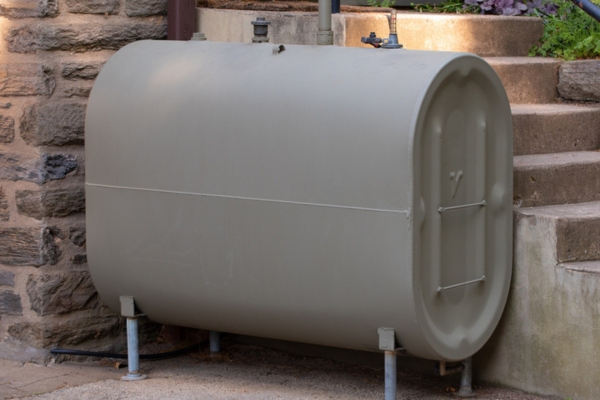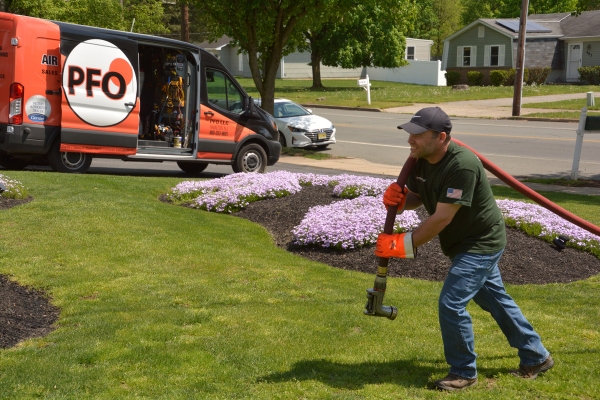
Heating oil is crucial in residential fuel tanks, not only for warming your home but also for heating your water. Depending on tank size and usage, the duration that the fuel remains viable can span months, guaranteeing sustained warmth through the chilly seasons. Maintaining the health of your fuel oil tank is essential to avoid issues such as sludge accumulation.
This viscous substance can develop over time, leading to significant inconveniences for homeowners. While it’s impossible to completely eliminate the formation of heating oil tank sludge, taking proactive measures can certainly delay its onset. By doing so, you enhance the longevity of your oil tank.
This article from PFO Heating & Air Conditioning explores the causes and mitigation strategies for heating oil tank sludge, emphasizing its formation and prevention.
Understanding Sludge Formation in Heating Oil Tanks
Contents
- 1 Understanding Sludge Formation in Heating Oil Tanks
- 2 Problems Associated With Tank Sludge
- 3 How to Prevent Heating Oil Tank Sludge
- 4 FAQ: Heating Oil Tank Sludge
- 4.1 What Are the Initial Indicators of Sludge Accumulation in Heating Oil Tanks?
- 4.2 Does Heating Oil Tank Sludge Impact the Lifespan of My Heating System?
- 4.3 How Frequently Should I Check My Heating Oil Tank for Sludge?
- 4.4 What Actions Should I Take If I Find Sludge During a Tank Inspection?
- 4.5 Are Certain Types of Heating Oil Better for Reducing Sludge Formation?
- 5 Conclusion
- 6 Contact PFO Heating & Air Conditioning for Trusted Heating Oil Deliveries & More
Sludge formation in heating oil tanks is a slow process that depends on several specific conditions. By comprehending the elements that contribute to sludge buildup, you can take action to prevent it. In the following sections, we will examine the components, known causes, related issues, and strategies for prevention.
What Is Heating Oil Tank Sludge?

Your heating oil tank holds more than just oil; it also accumulates dirt, debris, rust, and moisture. Microorganisms flourish in this damp, shadowy setting. These elements sink to the bottom of the tank and amalgamate into a dense sludge. The likelihood of sludge formation increases in nearly empty tanks, where residual fuel sits for long periods. Homeowners typically overlook their tanks post-winter, only to recall their existence as temperatures drop again. During refills, fuel delivery personnel may detect the presence of sludge.
Ensure Continuous Comfort. Depend on PFO Heating & Air Conditioning for prompt and dependable heating oil delivery. Arrange your delivery today by giving us a call!
What Causes Fuel Oil Tank Sludge?
Fuel tanks have a vent pipe that allows air to flow in and out, facilitating pressure balance within the tank. During fuel deliveries, air is expelled, often heard as a whistling sound, as the tank is filled with oil. Conversely, air is drawn into the tank as the oil is consumed. This interchange can lead to condensation when cold, moist air cools on the tank’s inner surfaces, promoting rust formation.
Over time, rust particles and other sediment settle at the bottom of the tank. Exposure to light, heat, air, water, and other elements in the tank causes the leftover fuel to degrade, providing a food source for bacteria. This, in turn, gradually creates sludge.
Problems Associated With Tank Sludge
Here, we explore the challenges caused by oil tank sludge.
Reduced Energy Efficiency
Addressing oil tank sludge is vital to maintain your heating system’s efficiency. Neglecting this issue only exacerbates it. Being thick and sticky, sludge can obstruct the supply line and clog the oil filter, potentially starving the heating system of necessary fuel. Even when some oil manages to seep through, a clogged filter compromises energy efficiency, leading to higher heating costs for your home.
Heating System Breakdown

Ignoring sludge in your heating oil tank is risky. While it may not seem urgent, sludge accumulation gradually strains your HVAC system, potentially leading to a complete shutdown. If sludge reaches critical components, it can cause significant damage, rendering your furnace or boiler unresponsive. This could necessitate costly repairs or even a complete system overhaul. Additionally, tanks compromised by leaks and sediment buildup might need replacing, significantly if rust has severely weakened the tank’s structure, posing further risks.
Stay Cozy. Count on PFO Heating & Air Conditioning for efficient heating oil delivery & oil tank solutions. Reach out to us today to schedule your next fuel delivery!
How to Prevent Heating Oil Tank Sludge
Preventing sludge formation is essential to avoid its detrimental effects. Implement these strategies to maintain a clean and efficient oil tank.
1. Schedule Regular Heating Oil Deliveries

Sludge tends to develop when fuel levels are low, allowing more air—and moisture—to enter and condense on the tank walls. To prevent this, arrange for oil deliveries before your tank runs low. Don’t wait until your tank is almost empty, as this increases the likelihood of fuel line blockages, which could abruptly cut off your supply and leave you without heat. Ensure you contact your local fuel oil provider in advance for timely delivery.
Keep Comfortable. Opt for PFO Heating & Air Conditioning for reliable heating oil services. Secure your delivery appointment today by contacting our team!
2. Use Heating Oil Additives
Adding a chemical additive to your heating oil tank can help prevent sludge formation. Introduce it into the tank before your next oil delivery to help break down any existing sludge, facilitating easier cleaning. Ensure the additive contains a dispersant compound by checking the label. You can find various options online, with features that include algae prevention, water removal, and wax-stopping capabilities. These treatments reduce the size of the particles, allowing them to flow freely through your system’s lines and filters.
It’s advisable to use such additives once each heating season for optimal maintenance. Additionally, some heating oil suppliers may already include these preventive additives in their oil. Always check with your provider to confirm if additives are already used in their oil before proceeding with this step.
3. Give Your Heating Oil Tank Some Attention
Show your heating oil tank some care with regular oil filter replacements and schedule a professional inspection. Technicians from PFO Heating & Air Conditioning will check for clogs and sludge deposits and address them promptly to prevent further issues.
4. Use High-Quality Home Fuel Oil
While many view heating oil as a standard commodity, not all fuel oils are created equal. Opt for premium quality oils that contain fewer impurities prone to forming sludge. Selecting a reputable supplier is crucial for ensuring you get the cleanest fuel. Consult with neighbors to find a trusted company that delivers high-quality fuel and offers assistance with sludge prevention. Their expertise can help you maintain your system effectively, keeping your home comfortable and your maintenance efforts minimal.
Fuel Your Warmth. Rely on PFO Heating & Air Conditioning for timely heating oil delivery. Ensure your next delivery by calling us today!
5. Keep the Heating Oil Tank Full
Many homeowners typically refill their heating oil tanks only during the colder months, allowing the tank to remain nearly empty during spring and summer. This leaves the tank largely filled with humid air, creating ideal conditions for rust and sludge formation. To prevent this, consider keeping your tank full even during the off-season. A full tank reduces the space available for air and water vapor, thus minimizing the risk of rust and bacterial growth.
FAQ: Heating Oil Tank Sludge

Discover essential information about heating oil tank sludge and learn how to manage it effectively.
What Are the Initial Indicators of Sludge Accumulation in Heating Oil Tanks?
Early indicators of sludge buildup in heating oil tanks are erratic furnace performance, regular clogging of filters, and a clear reduction in energy efficiency. Experiencing these problems may signal the need for a tank inspection to check for sludge.
Does Heating Oil Tank Sludge Impact the Lifespan of My Heating System?
Yes, sludge in your heating oil tank can drastically shorten the lifespan of your heating system. It may clog fuel lines and filters, stressing your furnace or boiler and causing early failures.
How Frequently Should I Check My Heating Oil Tank for Sludge?
It is advisable to inspect your heating oil tank for sludge at least annually, ideally before the onset of the heating season. This proactive approach helps ensure any problems are resolved before they affect your system’s performance during the colder months.
Maintain Your Heat. Choose PFO Heating & Air Conditioning for a reliable heating oil supply. Contact us today to schedule your delivery!
What Actions Should I Take If I Find Sludge During a Tank Inspection?
If you find sludge during an inspection, it’s recommended that it be professionally removed. Operating your heating system with a sludged tank can cause inefficiencies and increase the risk of breakdowns.
Are Certain Types of Heating Oil Better for Reducing Sludge Formation?
Yes, using high-quality, low-sulfur heating oil can significantly reduce sludge buildup. Additionally, some suppliers offer heating oils treated with additives that help minimize both sludge and corrosion in the tank.
Conclusion
While oil tanks may appear static, their interiors are dynamic environments. Air and fuel continually flow in and out, with water vapor condensing on the interior walls, promoting corrosion and fostering bacterial growth. To prevent sludge formation, keep the tank clean and well-filled. Opt for high-quality oil from trusted suppliers and seek professional assistance for more complex tune-up tasks to ensure your system stays efficient and effective.
Contact PFO Heating & Air Conditioning for Trusted Heating Oil Deliveries & More
PFO Heating & Air Conditioning is committed to ensuring that homes and businesses throughout the Greater Princeton, NJ area remain warm and comfortable with our dependable heating oil delivery services. We prioritize delivering top-quality heating oil swiftly and efficiently, ensuring you experience the warmth you need without the hassle. Our commitment to superior service includes offering competitive rates and transparent, straightforward services, always putting your comfort first.
Choosing PFO Heating & Air Conditioning means partnering with a reliable provider for your heating oil needs. With a reputation for consistent, dedicated service and a strong focus on customer satisfaction, PFO Heating & Air Conditioning has become a trusted name in the community. We are here to meet all your heating needs, keeping your environment cozy and inviting all winter. Contact us today to get started!
In addition to heating oil delivery, PFO Heating & Air Conditioning provides a comprehensive suite of HVAC services, positioning PFO Heating & Air Conditioning as your complete solution for home comfort. We handle everything from installation and routine maintenance to urgent repairs, ensuring comprehensive care for your HVAC systems.
Call us today to learn more about the products and services we offer. We provide free, in-home estimates.
Click here to contact us now or call us at (800) 253-9001 to find out more! Click the link to view our service area.

Related Articles:



